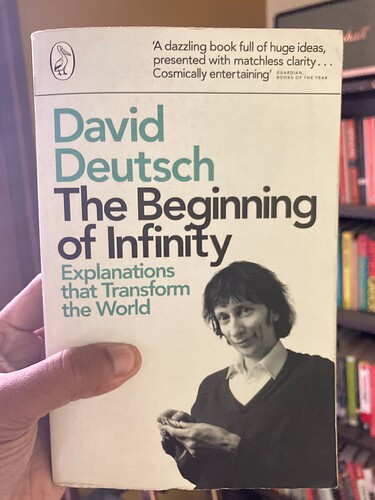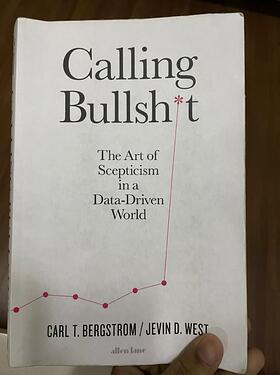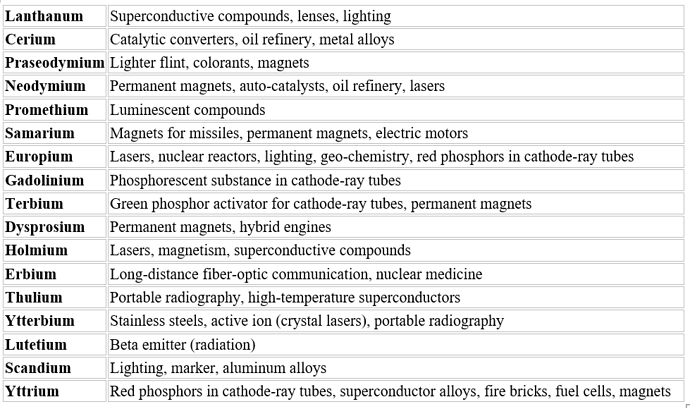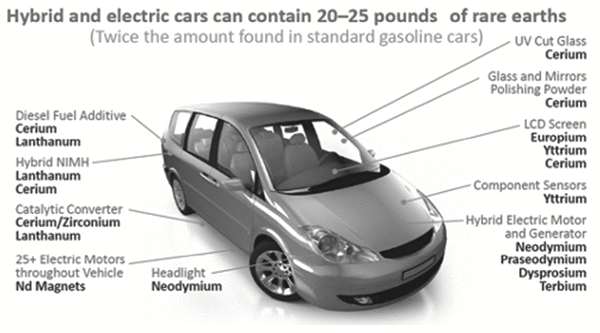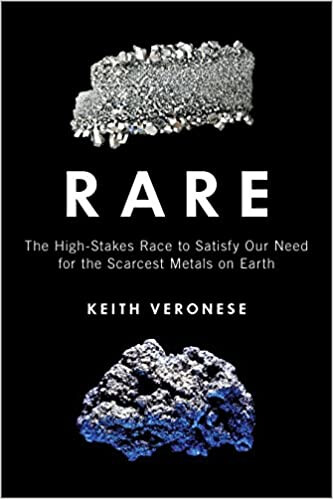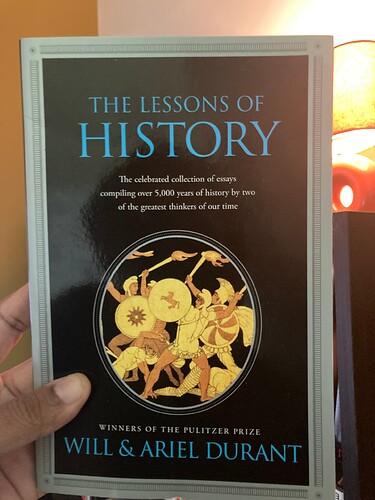The Beginning of Infinity, David Deutsch, 2011 - Books like these are soaring, inspirational and educational at the same time. They are good because they lead into many alleys of thought and shift your perspectives into seeing the world more critically. The book is filled with a lot of ideas which are probably mere conjectures and it is possible for you to question the audacity of some ideas and that is precisely why its so engaging and fun.
My notes -
• Rapid noticeable progress has happened only once and it started with the scientific revolution in the 16th century
• All progress, theoretical and practical can arise only from the quest for ‘good explanations’
• Within reach of our best telescopes that can see more galaxies than there are stars in our galaxy, there are several supernovae explosions per second that are brighter than all stars in the galaxy put together
• Empiricism - Belief that sensory experiences lead to theories and knowledge of reality. But scientific theories are never derived but “guessed” by making bold conjectures and verifying them. So experience is not the source from which theories are derived but is merely used to choose between theories that have already been guessed
• Inductivism - The process of obtaining reliable information on the future from the past, or inferring the general from the particular is inductive inference or induction. The belief that scientific theories are derived this way is inductivism
• No man ever steps into the same river twice, for it is not the same river and he is not the same man - Heraclitus
• Justificationism - Knowledge doesn’t need authority and ‘how do we know…’ questions don’t need to be transformed into ‘by what authority do we claim’. If not, then a quest for truth is converted into a quest for certainty. This misconception is Justificationism
• Fallibilism - There are no authoritative sources for knowledge, nor any reliable means for justifying ideas as being true or probable
• Fallibilists expect even their best and fundamental explanations to contain misconceptions and are predisposed to improve them for the better. In contrast, justificationists seek ways of securing ideas against change. Fallibilism is essential for initiation of unlimited growth - the beginning of infinity
• All observations are theory-laden and hence fallible (Karl Popper), unlike what empiricists like to believe. Sherlock Holmes (Empiricist) when he says it is a capital mistake to theorize before one has data unlike Watson who puts down circumstantial evidence as sketchy based on shifts in perspective and says there’s nothing more deceptive than obvious fact (Fallibilist)
• How is it that we can predict with some non-negligible degree of confidence that a design of microchip will work or a new drug will cure a particular disease even though they have never existed before? (we are great at formulating theories and coming up with explanations)
• Discoveries like fire, clothing, stone tools, bronze happened so rarely that from an individual’s point of view, the world never improved (not observable, unlike the change we have since 16th century)
• Scientific revolution was part of a wider intellectual revolution (Enlightenment) which also brought progress in moral and political philosophy and societal institutions. It was a rebellion against authority in regard to knowledge
• Pre-enlightenment belief was that everything important that was knowable was already discovered
• Royal society was formed in 1660 had the motto ‘Nullus, in verba’ (take no one’s word for it).
• A tradition of criticism is necessary for sustained, rapid growth of knowledge. Although usually the whole point of tradition is to keep things the same. The Enlightenment was at its root, a philosophical change
• Testability is the defining characteristic of scientific method. Popper called it ‘criterion of demarcation’ between science and non-science.
• Instrumentalism - It denies that explanations can exist at all. It denies that physical world is accessible to rational enquiry
• Relativism - There can be no objective true or false - only relative judgements can be made
• Curiosity about something implies that we believe that our existing ideas do not adequately capture or explain it
• Political, moral, economic and intellectual culture of what we now call ‘West’ rose around the quest for ‘good explanations’ and values around it like tolerance for dissent, openness to change, distrust of dogmatism and authority and an aspiration to progress by individual and society as a whole
• We do not test every theory but only the ones where we find ‘good explanations’ (like explanation for why gravity must bend light came before the experiment that proved light is bent by gravity)
• Conjectures are products of creative imagination but imagination can create fiction with ease than truth
• An explanation has reach when it solves problems beyond those that they were created to solve
• It is the 99% perspiration that powers the 1% inspiration (in a scientific discovery)
• We keep learning about how not to fool ourselves - Feynman
• We observe nothing directly - all observation is theory-laden
• Anthropocentric - Centered on human beings. Before science winter was attributed to someone’s sadness, harvests to someone’s generosity, disasters to someone’s anger and so on
• Parochialism - Mistaking appearance for reality or local regularities as universal laws
• Principle of mediocrity - There’s nothing special about human beings in the cosmic scheme of things
• Spaceship earth metaphor - That earth is like a hospitable spaceship that carries humans and is a friendly environment that provides
• Principle of mediocrity and Spaceship earth and have gained lot of acceptable among scientifically minded people since both oppose arrogance. First opposes pre-enlightenment arrogance of anthropocentricism and the second the enlightenment arrogance of aspiring to control the world. (We shouldn’t consider ourselves significant, we shouldn’t expect the world to submit indefinitely to us) - But both are false since we are significant in the cosmic scheme of things and earth was not a very hospitable place until man made it so (99.9% of species that ever existed on Earth is now extinct)
• Universe is a vast, empty place, mostly vacuum, dark matter and radiation. Concentrations of dense matter is very rare. It is familiar to us only because we are made of it. The density of atoms is below 1 per cubic meter. Almost all atoms are hydrogen or helium and there’s no chemistry - chemistry itself is very rare in the universe
• Our senses can’t detect neutrinos or quasars so there’s no reason to expect our brains to understand them. To the extent they already do understand them, we have been lucky
• There’s a intimate connection between explaining the world and controlling it
• Considering a genetically altered human as no longer human is a anthropomorphic mistake
• In present century there’s a 1/1000 chance of being hit by an asteroid. A child born today is more likely to die of an astronomical event than plane crash. Once diseases and ageing are successfully eliminated, people will care about ever longer-term risks.
• Progress is both possible and desirable is the quintessential idea of the Enlightenment
• Evolution - both biological and intellectual creates knowledge through error-correcting processes. In case of biological it is through accidental random mutations and in human knowledge, it is through non-random conjectures
• Creationism - Belief that some supernatural being or beings designed and created all biological adaptations (the gods did it). This is hard to reconcile this with the fact that there are several suboptimal features and organs without utility. (Argument that poor design has undiscovered purpose is a “bad explanation”)
• A child can design a video game biosphere than our so called gods, rendering them morally deficient and intellectually unremarkable
• Spontaneous generation - The belief that living organisms spurted out of non-living things - like mouse from a pile of rags
• Infinite regress - An argument or explanation depends on sub-argument of same form which tries to solve the same problem as original argument
• The argument from design is a bad explanation as it gets into infinite regress (who designed the designer?)
• An object like a watch found in earth’s crust would be hard to explain as it signals the presence of knowledge. The watch unlike a rock not only serves a purpose but its adapted for that purpose (several parts put together for a purpose - a rare configuration of matter).
• Lamarckism - Idea that improvement acquired by an organism in its lifetime can be inherited by its offspring which is bunkum since nothing in a tiger “knows” what its stripes are for and what would improve it. Knowledge must be first conjectured and then tested
• Not all evolution constitutes progress and no evolution optimizes progress. It can sometimes favor genes that are suboptimal and harmful to the species and all its individuals
• Knowledge embodied in genes is the knowledge of imparting functionality to the organism and replicating themselves (at the expense of other genes)
• Fine-tuning - Belief that a higher power tuned our biosphere for evolution to happen (type of creationism). Only in universes that contain astrophysicists can anyone ever wonder why physical constants seem fine-tuned (Weak-anthropic principle)
• Fermi’s problem - If extraterrestrials exist then ‘where are they’?
• Memeplex - A group of memes that help each others’ replication - similar to genes
• Emergence - Emergent phenomena are ones that pertain to a high-level of a configuration (like pressure of gas vs individual configuration of atoms at lower level)
• Reductionism - The doctrine that science always explains and predicts things reductively i.e by analyzing them into components
• You can’t derive an ‘ought’ from from an ‘is’ - moral theories cannot be deduced from factual knowledge (David Hume)
• Beauty, right and wrong, primality, infinite sets - they all exist objectively but not physically - you cannot trip over them in the street
• A writing system based on alphabet can cover not only all words in the language but also words that are yet to be coined. Ancestors to Phoenicians conceived it, spread it to mediterranean - the greeks added vowels to it
• Counting is next level above tallying. When tallying you are going ‘another, another, another’ rather than 1, 2 and 3. Tally marks, grouped (in 5) tally marks, I, V, X representation for them were incremental improvements that lead to counting
• Positional system of numerals that originated in India marked a vast jump in potential in science, math, engineering and trade
• Jump to universality - Gradually improving systems have a tendency to make a large jump in functionality, becoming universal in some domain (Like the positional numbers or Gutenberg’s movable type that triggered an avalanche of progress)
• Difference Engine (hardcoded functions) and Analytical engine (punched cards for automation) by Babbage and Ada Lovelace were made in the 18th century. Yet the internet revolution took a whole 200 years! ENIAC was allowed to jump to universality and put to diverse uses from weather forecasting to hydrogen-bomb project
• Douglas Hofstadter (one of my fav writer/thinker btw) argument for reductionism lies on the belief that it is not possible for low-level computational steps to add up to a higher level “I” (Deutsch disagrees)
• The genetic code has bases as its alphabets and replication is like programming in that language. For well over a billion years this system however was only making bacteria despite its jump to universality
• Qualia - subjective aspect of sensations - what blue will look like. Qualia are currently neither describable, nor predictable
• Testing intelligence - if you can’t program it, you haven’t understood it. In terms of explaining nature of consciousness or any computational task
• Chatbots have knowledge that is created elsewhere - its more a Lamarckian idea of intelligence. It can do Edison’s 99% perspiration but not the 1% inspiration
• Knowledge must be created during the “running” of the program than during the “creation” of it for it to be intelligent. Turing test doesn’t take this into account
• We do not understand how creativity works
• Finitism - The doctrine that only finite abstract entities exist (in math). Finitism is inherently anthropocentric and it regards parochialism as virtue than a vice. In finitism, the concept of infinity has no meaning and doesn’t exist (Wittgenstein denounced it, including whole of philosophy and his own work)
• Cantor founded the modern mathematical study of infinity - with his infinite sets. Taken forward by Hilbert’s infinity hotel which moved the needle a lot on understanding infinity
• An infinity that is small enough to be placed in one-to-one correspondence with natural numbers is a countable infinity
• Singularity - The abstract nowhere that exists at infinity. This might happen in reality too inside blackholes. If people in an infinite hotel passed trash from one room to next room, the trash would end up not in room number infinity but would cease to exist. If the reverse were to happen and something ends up in room 1, that wouldn’t be logically impossible but would merely lack an explanation. Big bang may have been a singularity
• The attributes of probable or improbable, typical or untypical, rare or common have literally no meaning in regard to comparing infinite sets of natural numbers
• Almost all mathematical truths have no proofs. They are unprovable truths (Kurt Godel)
• There’s nothing special about undecidable questions, non-computable functions, unprovable propositions - they are distinguished by physics only (Only laws of physics determine what’s finite in nature)
• Problems are conflicts between ideas
• P != NP. Class of mathematical questions whose answers can be verified efficiently once one has them but cannot be computed efficiently
• Interesting property of infinite sequences - Every element is exceptionally close to the beginning than the end. Unlimited progress is hence inevitable and we are only at the beginning of it and we will always be
• The future of civilization is unknowable because the knowledge that is going to be affect it is yet to be created
• Prediction and prophecy are only separated by a good explanation
• Churchill suffered intense depression, yet was an unusually positive person. Malthus, the notorious prophet of doom is said to have been a serene and happy fellow
• An alien civilization will never come here to invade us and steal our gold, oil or water for such a civilization would be capable of cheap transmutation
• The idea that there could be beings that are to us as we are to animals is a belief in the supernatural
• At any instant, our best knowledge contains both truth and misconception
• Prophecy is prone to systematic pessimistic bias
• Science is what we have learned to keep from fooling ourselves - Feynman
• Systems of govt. shouldn’t be judged for the ability to choose good ones but the ease with which bad ones can be removed
• Unless a society is expecting its own future to be better, it will strive to make its present as immutable as possible
• All evils are caused by insufficient knowledge.
• Optimism is a way of explaining failure, not prophesying success
• The fable of prisoner who made a deal with tyrannical king from being sentenced to death by promising to teach the king’s fav horse to talk within a year - his reasoning - ‘A lot can happen in a year. The horse might die. The king might die. I might die. Or the horse might talk’ 
• An easy problem that is not deemed interesting or useful is better left unsolved, than a hard problem that is interesting or useful (like going to the moon)
• Sparta vs Athens. Pessimistic civilisation with rigid education, beliefs vs an optimistic one with flexible beliefs and learning. Sparta seeks stasis while Athens seeks improvement. While both can co-exist, the very existence of Athens is a deadly threat to Sparta’s stasis
• Epistemology - knowledge about knowledge
• Justified belief is unattainable to humans except in the form of self-deception.
• People who converge upon the truth converge with each other
• The rare and deadly sort of error is the one that prevents from undoing itself (say a dictatorship). The only moral imperative should be to not destroy the means of correcting mistakes
• Nothing is easy to see without prior knowledge. (What we observe is completely a function of what we have already seen/known). When we hear something being said, we guess what it means, without realizing what we are doing. Guesswork is the origin of all knowledge, it is also the source of error
• Socrates is the wisest man in the world because he is the only one who knows he has no knowledge, because genuine knowledge is impossible
• Plato may have faithfully conveyed Socrates philosophy when he was young but later in life simply used Socrates as a vehicle for conveying his own views
• If we were to discover that Einstein wrote all his work at gunpoint, it wouldn’t change a thing in physics textbooks
• Good plot always rests, implicitly or explicitly on good explanations of how and why events happen
• Dollars in bank accounts are completely fungible. There is no meaning to which dollar was spent or received - they are configurational entities, not physical objects. Same thing applies to energy dissipated as heat - it makes no sense if its first 5 KJs or what was added later
• Since dollars in an account are fungible and you owe a certain sum to the tax authorities - now we have a situation in which a collection of entities though fungible do not all have the same owner. Quantum mechanics and randomness is driven by similar underlying fungibility
• Common sense and classical physics carry the parochial error that only one history exists. This makes it sound odd that an event can in one sense by extremely unlikely and in another certain to happen
• Interference provides evidence that multiple histories exist without allowing the histories to communicate. Interference can only happen in objects that are unentangled with the rest of the world (fantastic explanation for these parts in the book)
• Decoherence is undoing the entanglement of all affected objects. This is possible only at microscopic scales
• Speed is defined as distance/time but its not meaningful in a situation where there’s no such thing as a particular instance of the particle
• Atoms cannot exist at all according to classical physics - electrons would fall into the nucleus from attraction in a flash of radiation. We mistook the structure of atoms to be analogous to the solar system. In reality the electron is more like an ink blot.
• Typical electron is an irreducibly multi-versal object. Uncertainty principle - uncertain on position/speed is no different from being uncertain on which dollar in your account belongs to the tax dept.
• In quantum computation, special care is taken to prevent qubits from entanglement by cooling them close to absolute zero. Interference process collects all the individual information into a single history. A quantum computer with only a few hundred qubits can perform far more computations in parallel than there are atoms in the visible universe
• Quantum mechanics of time isn’t well understood and wont be until quantum theory is unified with general theory of relativity
• Different times are special case of different universes (time is an entanglement phenomenon)
• When we observe anything, a galaxy or a human being, we are observing a single-universe perspective on a larger object that extents some way into other universes. We are channels of information flow
• They are not alternatives but all happen simultaneously - Schrodinger in 1952 - earliest known reference to the multiverse
• Error is the normal state of our knowledge and is no disgrace
• Bad philosophy cannot be easily countered by good philosophy since it holds itself immune. Progress makes bad philosophy harder to believe (No religion’s god claims thunder anymore)
• Democracy isn’t just about people choosing who should rule, like choosing a priest or an oracle, or a king. Very essence of democracy lies in what happens between elections - the ideas created, tested, modified and rejected - So its not the choosing of options but the creation of options that makes a good democracy
• Extraterrestrials whose senses detected radio waves but not light or sound would have an art inaccessible to us
• We have an inborn aversion to heights and to falling and yet people go skydiving - not in spite of this feeling, but because of it
• Flowers create objective beauty and insects evolve to be attracted to it - both genes co-evolved. But what is surprising is human-beings liking flowers - perhaps due to our inborn tendency to like symmetry
• Poetry, math and physics develop different language because ordinary language would be inefficient for its purposes
• It is very rare for two people to hold precisely the same cultural idea in their minds. This is typical of cults that split post founder’s death. Overwhelming majority of ideas disappear within a lifetime or less
• So behavior of people in a long-lived culture is therefore affected by soon-to-be-extinct recent ideas and partly by long-lived memes, ones that have been replicated faithfully across many lives in succession
• Just genes, memes affect people the same way. People enact behaviors and give false explanations, even to themselves as to why they are behaving a certain way
• Genes get replicated irrespective of immediate use (gene for fixing broken bones will be passed on, irrespective of either parent having a fracture in their lifetime), vs a meme which needs to be enacted as behavior for it to be replicated
• Memes like genes are selfish, they do no necessarily evolve to benefit the holders. Memes that harm society are a familiar phenomenon (This book was written pre-internet meme craze, so mostly refers to religious and cultural ideas as memes)
• Static societies always have ways of crippling creativity of their children to extend tradition. It can perpetuate itself only by suppressing its members self-expression and breaking their spirits - its memes are tuned to doing this
• It is impossible to speak in such a way that you cannot be misunderstood - Popper
• Apes are able to imitate behavior without ever creating explanatory knowledge via behavior parsing
• People are problem-solvers - while solving they inevitably create the next set of problems with their unsustainable solution and the cycle is what leads to progress. Problems are inevitable and problems are soluble and progress is sustainable.
• Almost no one is creative in fields in which they are pessimistic
• Theories can perhaps be called misconceptions to aid progress - like Einstein’s misconception of gravity was an improvement over Newton’s misconception which was an improvement over Kepler’s misconception
• Infinite ignorance is a necessary condition for there to be infinite potential for knowledge
This is one of the most optimistic books you can ever read although it takes a very different route to that optimism instead of hammering the point like Matt Ridley’s ‘The Rational Optimist’. People with a growth mindset and love physics are bound to relate to it a lot more than others. 11/10



